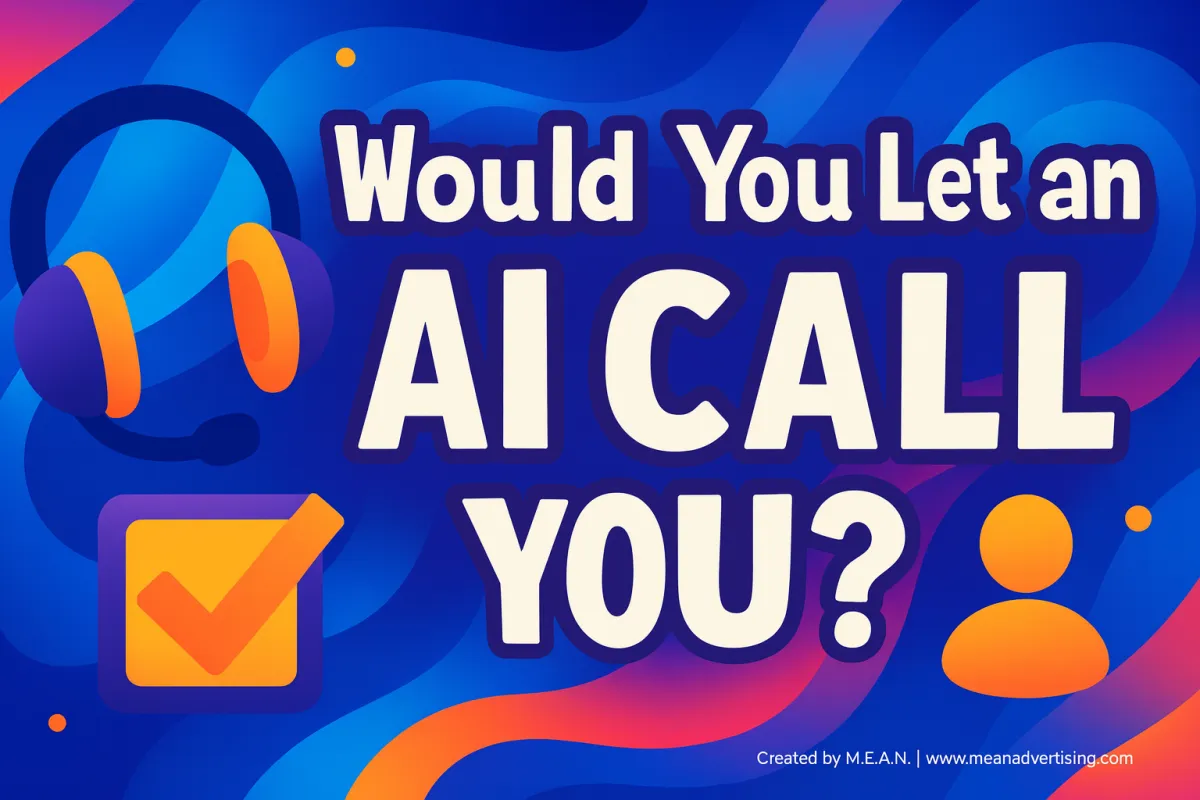
Would You Let an AI Call You? Let’s Talk About A.I. Outbound Calling
Would You Let an AI Call You? Let’s Talk About A.I. Outbound Calling

Artificial intelligence isn’t just answering questions anymore — it’s calling people. Before you roll your eyes or clutch your phone in fear, think about what that actually means for small businesses.
We’re entering an age where AI outbound calling can replace the old-school call center — not with robots reading monotone scripts, but with trained digital voice assistants that hold full conversations, answer questions, and even schedule appointments in real time. For growth-minded small businesses, this is a game-changer: fewer missed calls, faster responses, and a smoother customer journey from first touch to booked appointment.
Done right, conversational AI phone calls feel professional and personal. They identify the intent, pull context from your CRM, and escalate to a human instantly when needed. The result? Higher conversion rates, lower staffing costs, and a better experience for customers who just want quick answers and a clear next step.
Want help building this into your marketing stack? Explore how we help at MEAN ADVERTISING.
The Use Cases Are Endless
1) Law firms: never miss a free consultation
An AI legal intake assistant trained on your firm’s knowledge base can explain services, pre-qualify leads, check conflicts, and book real consultations 24/7. It can send follow-up emails/texts with directions, collect documents, and route high-value cases straight to an attorney or closer.
2) Home cleaning: quotes, add-ons, and reschedules
“Do you use pet-safe products?” “Can I add oven cleaning to my next appointment?” Your voice AI can answer FAQs, deliver instant quotes, upsell common add-ons, and handle reschedules or reminders automatically — all while syncing back to your CRM so you keep a clean pipeline and calendar.
3) HVAC and trades: after-hours coverage
When it’s 10:30 p.m. and a unit fails, your AI answers, offers basic troubleshooting, and sets up emergency dispatch. No lost leads. No waiting until morning. No angry customers left on voicemail.
4) Restaurants: reputation + loyalty, on autopilot
Your AI can call recent reviewers, thank them, and offer a personalized coupon code or reservation link. It closes the loop on feedback while driving repeat visits.
5) Roofing and home services: storm-response at scale
After a storm, AI can call homeowners to offer free inspections, answer insurance questions, and pre-qualify interest before sending warm leads to sales — turning chaotic demand into organized opportunity.
This isn’t science fiction. It’s already live in forward-thinking businesses — and it’s going to separate those who act now from those who keep “meaning to get back to that voicemail.”
The Big Question: Are You Comfortable With It?
When someone checks a box agreeing to receive calls or texts, they’re not just saying yes to a company anymore — they’re saying yes to AI. AI that talks. AI that follows up. AI that can learn your preferences and tone.
Would you answer a call that says, “Hey, this is HRI Roofing’s virtual assistant — we noticed you asked about a quote. Can I get a few quick details to connect you with the right person?” Or would you hang up the second you realized it wasn’t a human?
My take: It’s great — when it’s transparent, respectful, and helpful. AI outbound calling lets small businesses operate like giants: no missed calls, no awkward scheduling gaps, no wasted leads. The real test isn’t the technology — it’s comfort and consent.
Consent, Compliance, and Customer Trust
Responsible AI calling starts with clear opt-in and easy opt-out. If you call or text in the U.S., get familiar with the basics of consent and honest disclosures:
Always disclose you’re an AI or virtual assistant at the beginning of the call.
Honor opt-outs immediately and don’t call after quiet hours.
Log consent and calling preferences in your CRM and keep them current.
Provide a frictionless path to a human at any time.
Helpful references:
This is not legal advice. Work with counsel to align your AI calling strategy with your market and state requirements.
Best Practices That Make AI Calls Feel Human
Be transparent: “Hi, I’m Company’s virtual assistant. I can help with quotes and scheduling. Want to continue?”
Offer human fallback: One word like “agent” or “human” routes to a person, instantly.
Keep tone natural: Short sentences, confirm details out loud, avoid jargon.
Respect time and frequency: Local hours, local presence, limited attempts, and never spam.
Handle edge cases: Accents, background noise, low reception — verify and repeat crucial info.
Record responsibly: If you record, disclose according to applicable law and store securely.
Close the loop: Send a confirmation SMS/email with the date, time, and any prep instructions.
Getting Started: A Quick Implementation Checklist
Define goals: Lead qualification, appointment setting, reactivation, review outreach, or after-hours support.
Train on your data: Services, pricing ranges, coverage area, FAQs, calendar rules, and escalation paths.
Integrate your stack: Sync CRM, calendars, phone system, and helpdesk so every call has context.
Design the conversation: Craft intents, confirmations, and graceful handoffs to humans.
Pilot and QA: Start small, review transcripts, tune prompts and guardrails, and iterate weekly.
Track outcomes: Measure contact rate, qualification rate, bookings, show rate, and downstream revenue.
Need help? Talk to MEAN ADVERTISING about deploying AI voice that fits your brand and pipeline.
FAQs
Isn’t this just robocalling?
No. Robocalls blast recordings. Modern AI outbound calling is interactive: it listens, responds, answers questions, and books appointments — and it should be used only with proper consent and clear disclosures.
Will customers hate it?
People dislike bad automation. They appreciate quick, helpful service. If you’re honest that it’s a virtual assistant and you make it easy to talk to a human, satisfaction typically goes up — especially after-hours.
What results can small businesses expect?
Most see fewer missed calls, faster speed-to-lead, more booked appointments, and higher close rates from better qualification. Impact varies by offer, script quality, and how well you integrate AI into your workflow.
Your Turn
Would you let an AI call or text you if it made your experience smoother — or is that a hard no? Drop your thoughts below. Because ready or not, the future of customer contact isn’t waiting for permission — it’s already dialing.
Want a walkthrough? Get a quick demo from https://www.meanadvertising.com/.

